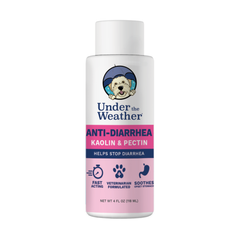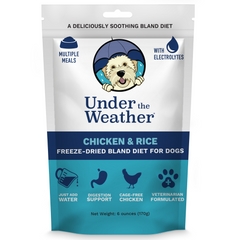Dog diarrhea is a common issue that many pet owners encounter at some point. While most cases of diarrhea in dogs are relatively harmless and quickly resolve on their own, it is important to know when it may be an emergency requiring immediate veterinary care.

Today we discuss the basics of dog diarrhea, provide guidelines for how to identify symptoms, learn when to seek veterinary care, explore treatment options, and outline preventive measures to help avoid future episodes. Let's start by understanding what dog diarrhea actually is.
The Basics of Dog Diarrhea
What is Dog Diarrhea?
Dog diarrhea is defined as the frequent passage of loose or watery stools. It is important to note that occasional loose stools alone may not necessarily indicate a problem, as dogs can have temporary bouts of diarrhea due to dietary indiscretion or stress. However, if diarrhea persists longer than a day or two, or if it is accompanied by other concerning symptoms, it is essential to take action.
When a dog experiences diarrhea, it can be a sign that something is not right within their digestive system. The consistency of their stool changes, becoming loose and watery, which can lead to accidents in the house or discomfort for the dog. Although it isn’t especially glamorous, dog owners must pay attention to their pet's bowel movements and take appropriate measures to address any issues that arise.
Dog diarrhea can vary in severity, ranging from mild and self-limiting cases to more severe and chronic conditions. Understanding the common causes of dog diarrhea can help dog owners identify potential triggers and take appropriate action.
Common Causes of Dog Diarrhea
There are numerous potential causes of dog diarrhea, ranging from simple dietary changes to serious underlying health conditions. Common culprits include:
- Food allergies or intolerances
- Ingestion of toxic substances
- Bacterial or viral infections
- Parasites such as worms or giardia
- Inflammatory bowel disease
- Pancreatic disorders
Determining the specific cause of diarrhea is crucial for appropriate treatment, so let's move on to identifying the symptoms associated with this condition.
Food allergies or intolerances can cause a dog's digestive system to become irritated, leading to diarrhea. Dog owners must remain aware of any recent changes in their pet's diet and be careful to introduce new foods gradually to avoid potential adverse reactions. Ingestion of toxic substances, such as certain plants or household chemicals, can also trigger diarrhea in dogs. It is essential to keep potentially harmful substances out of a dog's reach to prevent accidental ingestion.
Bacterial or viral infections can cause inflammation in the dog's gastrointestinal tract, resulting in diarrhea. These infections can be transmitted through contaminated food, water, or contact with infected animals. Parasites, such as worms or giardia, can also cause diarrhea in dogs. Regular deworming and proper hygiene practices can help prevent these parasitic infestations.
Inflammatory bowel disease and pancreatic disorders are more serious conditions that can lead to chronic diarrhea in dogs. These conditions require veterinary intervention and ongoing management to provide relief and improve the dog's quality of life.
By understanding the common causes of dog diarrhea, dog owners can be better equipped to identify potential triggers and seek appropriate veterinary care when necessary. It is important to remember that each dog is unique, and what may cause diarrhea in one dog may not affect another. Therefore, it is crucial to monitor your dog's health closely and consult with a veterinarian for a proper diagnosis and treatment plan.
Identifying Symptoms of Dog Diarrhea
Physical Signs in Your Dog
When observing your dog, you may notice various physical signs that can indicate the presence of diarrhea. These include:
- Frequent bowel movements
- Watery or liquid consistency of stools
- Presence of blood or mucus in the stools
- Straining or urgency during defecation
- Loss of appetite or weight loss
- Dehydration
Keep a close eye on these signs, as they can give you important insights into your dog's health. However, physical signs are not the only indicators. Changes in behavior can also signal the presence of diarrhea.
Changes in Behavior
If your dog is experiencing diarrhea, you may observe changes in their behavior. These can include:
- Restlessness or lethargy
- Irritability or aggression
- Avoidance of food or water
- Excessive thirst
- Frequent licking of the anal area
If you notice any of these behavioral changes alongside diarrhea, it is essential to assess the severity of the condition and determine whether veterinary care is necessary.
When it comes to frequent bowel movements, you may notice that your dog needs to go outside more often than usual. This can be a clear indication that their digestive system is not functioning properly. Additionally, the watery or liquid consistency of stools is another common symptom of diarrhea. You may find it difficult to pick up your dog's stool as it lacks the usual solid form.
The presence of blood or mucus in the stools can be alarming. If you notice any red streaks or a slimy texture in your dog's stool, it is important to take action and monitor their condition closely. This can be a sign of inflammation or infection in the gastrointestinal tract.
Straining or urgency during defecation is another physical sign to watch out for. Your dog may appear to be in discomfort or may exhibit a sense of urgency when trying to relieve themselves. This can be a result of the irritation caused by diarrhea.
Loss of appetite or weight loss can occur when your dog is experiencing diarrhea. The discomfort and digestive issues may cause them to lose interest in food or experience a decrease in their appetite. If you notice a significant change in their eating habits, it is important to address it promptly.
Dehydration is a potential consequence of diarrhea in dogs. When they have loose stools, they can lose a significant amount of fluids, leading to dehydration. You may notice signs such as dry gums, sunken eyes, or lethargy. It is crucial to ensure your dog stays hydrated during this time by providing them with fresh water and, if necessary, consulting your veterinarian for additional guidance.
While physical signs provide valuable information, it is also essential to pay attention to changes in your dog's behavior. Restlessness or lethargy can be indicators that your dog is not feeling well due to diarrhea. They may appear more tired than usual or have difficulty settling down.
Irritability or aggression can also be behavioral changes associated with diarrhea. Your dog may become easily agitated or display signs of discomfort when approached or touched. It is important to handle them with care and provide a calm and soothing environment.
Avoidance of food or water is another behavioral change to be aware of. Your dog may show disinterest in their regular meals or may refuse to drink water. This can further contribute to dehydration and should be addressed promptly.
Excessive thirst can be a compensatory mechanism in response to the fluid loss caused by diarrhea. Your dog may drink more water than usual to try to replenish the fluids they have lost. While it is important to provide them with access to water, if you notice an extreme increase in thirst, it is advisable to consult your veterinarian.
Frequent licking of the anal area is a behavior that may accompany diarrhea. Your dog may feel discomfort or itchiness in that region due to the irritation caused by loose stools. It is important to keep the area clean and monitor for any signs of inflammation or infection.
Remember, if you notice any of these behavioral changes alongside diarrhea, it is crucial to assess the severity of the condition and determine whether veterinary care is necessary. Your veterinarian can provide a proper diagnosis and recommend appropriate treatment to help your dog recover.
When to Seek Veterinary Care
Indications of a Serious Condition
While many cases of dog diarrhea can be managed at home, certain indications may suggest a more serious underlying condition. It is crucial to seek veterinary care in the following situations:
- Bloody or black, tarry stools
- Severe abdominal pain or swelling
- Persistent vomiting
- Signs of dehydration, such as dry mouth and sunken eyes
- Lethargy or weakness
- Significant weight loss
- Preexisting health conditions or compromised immune system
If any of these symptoms are present, consult your veterinarian promptly, as they can help determine the best course of action to alleviate your dog's discomfort.

The Role of the Veterinarian in Diagnosing Diarrhea
When you visit a veterinarian for your dog's diarrhea, they will conduct a thorough examination and may perform additional diagnostic tests to pinpoint the cause. These tests may include:
- Fecal analysis to check for parasites or bacterial infections
- Blood tests to evaluate organ function and identify potential underlying diseases
- Imaging studies, such as X-rays or ultrasound, to assess the gastrointestinal tract
- Dietary trials to identify food allergies or intolerances
Based on the findings, your veterinarian will develop a tailored treatment plan to address the specific cause of diarrhea and provide relief for your furry companion.
Treatment Options for Dog Diarrhea
Home Remedies and When to Use Them
In mild cases of dog diarrhea, home remedies can be employed to alleviate symptoms. These include:
- Temporary fasting to allow the gastrointestinal tract to rest
- Probiotics to restore the balance of beneficial gut bacteria
- Feeding a bland diet, such as boiled chicken and rice
- Maintaining adequate hydration through fluids and electrolyte-replacement solutions
- Avoiding certain foods that may exacerbate the condition, such as fatty or spicy foods
However, it is important to consult your veterinarian before administering any home remedies, as they can guide you on the appropriate course of treatment based on your dog's individual needs.
Medications and Therapies for Severe Cases
In more severe or persistent cases of dog diarrhea, medications and therapies may be necessary. Your veterinarian may prescribe:
- Antibiotics to combat bacterial infections
- Anti-inflammatory medications to reduce intestinal inflammation
- Antiparasitic drugs to eliminate parasites
- Prescription diets formulated to support digestive health
- Fluid therapy to address dehydration
Remember to follow your veterinarian's instructions carefully and complete the full course of treatment to maximize the chances of a successful recovery.
Preventing Future Episodes of Diarrhea
Dietary Adjustments for Your Dog
Proper nutrition plays a pivotal role in maintaining your dog's digestive health and preventing future episodes of diarrhea. It is important to:
- Feed a nutritionally balanced diet appropriate for your dog's age and breed
- Avoid sudden or frequent changes in diet, gradually transitioning to new foods when necessary
- Offer regular meals and avoid excessive table scraps or treats
- Identify any food allergies or intolerances and eliminate the offending ingredients from your dog's diet
- Consider incorporating probiotics or prebiotics to promote a healthy gut microbiome
Additionally, regular check-ups and vaccinations play an essential role in preventing illnesses that can lead to diarrhea.
Importance of Regular Check-ups and Vaccinations
Regular visits to your veterinarian ensure that your dog's overall health is monitored and potential issues are detected early on. Vaccinations protect against infectious diseases, some of which can cause diarrhea. By staying up-to-date on vaccinations, you can significantly reduce the risk of your dog experiencing diarrhea due to preventable infections.
Final Thoughts
In conclusion, while dog diarrhea is a common occurrence, it is crucial to recognize when it may be an emergency necessitating veterinary care. By understanding the basics of dog diarrhea, identifying symptoms, knowing when to seek professional help, exploring treatment options, and implementing preventive measures, you can provide your furry companion with the care they need and potentially prevent future episodes of diarrhea. Remember, when in doubt, always consult your veterinarian, as they are best equipped to guide you through the management of this condition.
Every Sale Supports a Shelter Pet. Learn More.
Created in Vermont. Learn More.
Written by: Min Lee
If you suspect your pet is sick, call your vet immediately. For health-related questions, always consult your veterinarian, as they have examined your pet, know the pet's health history, and can make the best recommendations for your pet.














